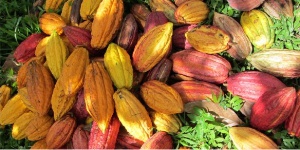The country’s lifeblood, cocoa is being threatened by the activities of loggers and illegal miners.
The Chief Executive Officer of the Ghana Cocoa Board (COCOBOD), Mr. Antony Fofie, has indicated that the country risks losing about 90% of its cocoa farms if adequate action is not taken to regain farmlands given out as concessions for logging.
Almost all cocoa farms, which are mostly located in parts of Brong Ahafo, Eastern and Ashanti regions, have been licensed by the Lands Commission as areas demarcated for logging by chainsaw operators.
With various measures instituted by government to shore up the industry which has experienced mixed fortunes, the industry in 2010 produced one million tons of the beans, a feat that has been considered unprecedented in the annals of the cocoa production in Ghana.
These interventions include mass spraying of cocoa farms, the supply of free seedlings, bonuses to motivate farmers and the annual increase of the producer price, except this year, has seen the fortunes of the industry restored to the glory days of yore, when Ghana was the undisputed lead producer of the commodity world-wide.
The pursuit of precious metals by people referred to as small-scale miners has also spelt doom for the industry in many parts of the Western region since many farms have been given out on concessions to these miners.
Ghana has remained a stoic second in terms of production globally, after our neighbours, Ivory Coast, and this position must not see a further decline since it would not only mean less foreign reserves from the commodity but would also exacerbate the current unemployment situation in the country.
According to Mr. Fofie, illegal miners have invaded between 1.5 million hectares and 1.7 million hectares of cocoa farmlands, destroying cocoa trees to explore for gold.
Coupled with the above, the industry as whole is suffering from challenges such as climate change and pest control. Climate change has also been a major cause of the limitation in cocoa production in recent times and it affects the size and quality of the cocoa beans.
The enhanced performance of the commodity value chain is in question with all these challenges. It is therefore time to look seriously at ways to ensure the continuous production of this valuable crop that is so crucial to the fortunes of the country.
Business News of Friday, 1 November 2013
Source: B&FT













